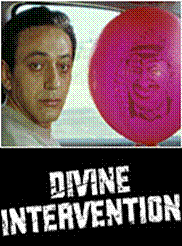 Organ of Alliance Marxist-Leninist (North
America)
Organ of Alliance Marxist-Leninist (North
America)
Volume 1, Issue 5; June-July 2003 $1.00
A
L L I A N C E ! ,A
Revolutionary Communist Monthly
Divine Intervention, a film
by Elia Suleman. A review by Hari Kumar

This haunting film speaks to the desolation of what
a fascist Israeli state has done to the Palestinian people’s gentleness.
From this gentleness, has been created a searing, absolutely raging hatred.
Every frame of the film talks to this situation. It is a very spare, or
‘minimalist’ film, with very little dialogue, although overheard snaps
of conversation twist an ever growing alienation. Unlike many films in
the bourgeois cinema, this film does not disguise its hatred in any usual
“genteel” manner. Sometimes, the hatred is made palatable in an intense
symbolism, one that however is rendered in a realistic manner.
This needs explanation. For usually, in an artistic
sense, “symbolism” is a cover for non-realism. However in this film that
cannot be said. For example, the very first scene is of a bizarre chase,
where four young Arabs chase a man dressed in a Santa Claus costume through
a parched field, while he loses his presents. They corner him, but the
denouement is not seen. In the context of the film, the chase seems a metaphor
for the “false presents” of imperialism.
Then the film cuts to its real opening shots, where
for 10 minutes, an Arab neighborhood in Jerusalem comes to life in the
morning. The people make do with normal life, or what passes for it, while
Israeli police casually arrest some neighbors. Arbitrary behaviors of the
police and the Israeli army are a major centerpiece of the film, which
only becomes apparent almost half way through the film. But desultory neighborhood
scenes gradually carry more social freight as the movie progresses. So
a man drives through the city, in a rage, muttering profane angry replies
to waves of greeting, saying “collaborationist mother fucker!” for example,
as he passes. The raging hatred begins to erupt even in a simple scene
of driving through a neighborhood.
Slowly the two main protagonists become clear. One
of the neighbors has a son who lives on one side of an Israeli border post
between Ramallah and Jerusalem. The first shot of this forbidding border
post, shows a line of cars waiting to get through. As any informed person
knows only too well by now, Arab livelihood often depends on getting through
the border. Well, the Israeli guards shut down the border arbitrarily.
As the cars hoot their horns in frustration, the guards start brandishing
their guns and shooting to intimidate the drivers, who all rapidly turn
their cars around and roar off. Except for one. A young lady walks out
of her car, staring down the soldiers, lifts her shades as she dares them
to shoot her, and she walks across the border. As she walks across, the
border observation tower crumbles to the ground. The resistance of
one person is enough - is the message. It is this lady who is in love with
the son of the raging driver in the neighborhood scene. She obviously lives
on the other side of the border. They rendezvous by the side of the border
post watching the vicious guards at their work-play.
In one particularly brutal charade, the border guards
snap the border shut on the eve of Ramadan. A guard walks up and down the
cars humiliating the drivers, forcing them to walk out and dance with him
as he shuts out the words of an Israeli insulting song. He then “shuffles”
the drivers as he sees fit, into one another’s cars. The son watches all
this as he awaits his rendezvous with his lover. The scenes with the lovers
take place in a car, as they both drive to the border to tryst. The moral
is clearly that the border and the guards pervert even an otherwise innocent
human love. The relationship between the two lovers is shown as intimate,
only by the intertwining of hands over the gear stick of the car, itself
very sensuous – but limited by the environment.
Slowly the anger grows and takes focus. The man driving
along a street, is at a traffic light. A car driven by a cap-wearing Jew
stops. He looks at him, and puts on a cassette and puts his windows down,
while donning some shades. The tape sings “you belong to me“, while the
Jew looks back to confront the blunt anger. The woman meanwhile, deliberately
walks past a collaborator Arab who is having a tête-à-tête
with the Israeli police – staring at them in a “I know who you are” manner.
Unsurprisingly, this woman becomes a stark representation
of the Intifada. In a scene that combines ancient mythic heroism, with
the latest kung-fu surrealism, the woman is represented as a target for
5 trainee Israeli gunmen. They advance to the 5 life size targets showing
an Arab woman in a Khafeih, and shoot them all down – bar one. As they
rearm to shoot it down, a real woman steps form behind it – it is our heroine.
As she throws somersaults and kills them, any impulse to laugh is chilled
by the absolute seriousness of the hatred informed by the prior “small”
pieces of a daily humiliation have been absorbed. As a helicopter gun-ship
is called in, this woman defeats that. Again, a metaphor for resistance
to the last against over-whelming odds is shown.
The final scene is characteristic of the ‘domestic’
side of this film. The son who has just lost his father, and his mother,
watch a pressure cooker on a stove from a sofa. It has reached its set
pressure, and the woman says, “Surely it is time enough now”. No one moves,
watching & hearing the pressure in the cooker go up and up.
This is a highly pressurized film, which should
worry the Israeli fascists by its deep humanity. That will speak volumes
to many filmgoers.
End.

 Organ of Alliance Marxist-Leninist (North
America)
Organ of Alliance Marxist-Leninist (North
America)
